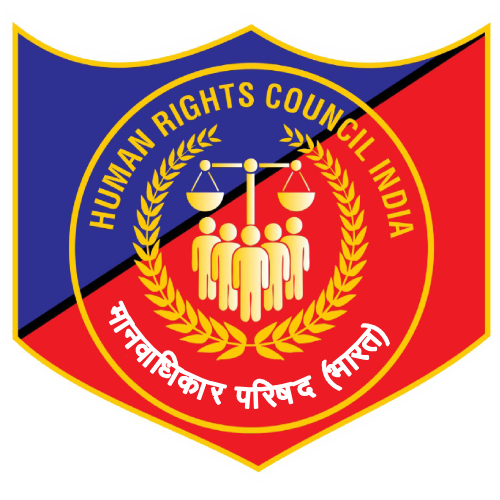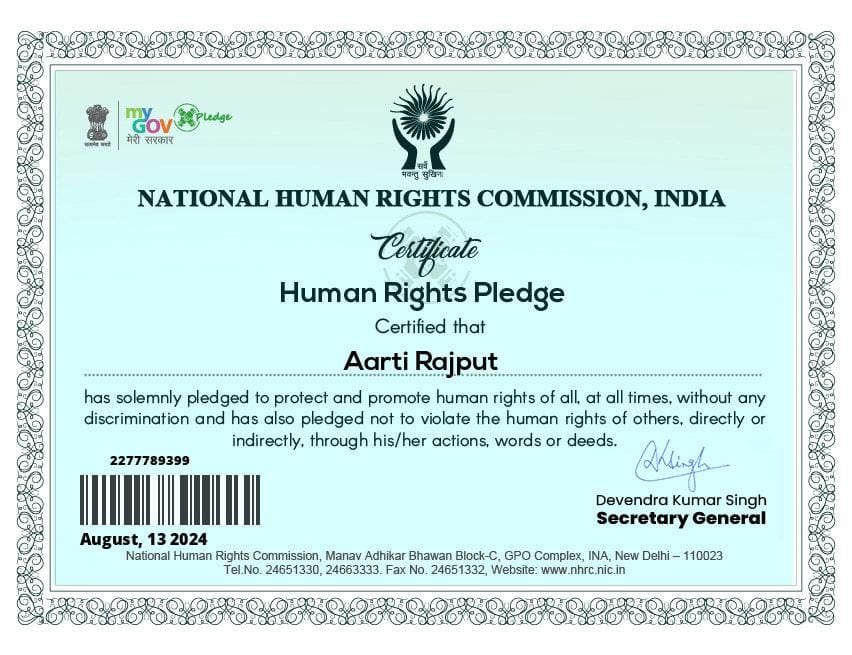
HUMAN RIGHTS COUNCIL INDIA
The Human Rights Council India , India has been set up by an Act of Parliament under the Protection of Human Rights Act, 1993 for the protection and promotion of human rights. The functions of the Council as stated in Section 12 of the Act and apart from enquiry into complaints of violation of human rights or negligence in the prevention of such violation by a public servant, the Council also studies treaties and international instruments on human rights and make recommendations for their effective implementation to the Government.
The Council is responsible for spreading of human rights awareness amongst the masses and encouraging the efforts of all stake holders in the field of human rights literacy not only at the national level but at international level too. HRCI is a unique institution because it is one of the few Human Rights Institutes (HRCI) in the world whose Chairperson is the former Chief Justice of the country. The world looks at HRCI of India as a role model in promoting and monitoring effective implementation of promotion and protection of human rights.
Section 2(1) (d) of the PHR Act defines Human Rights as the rights relating to life, liberty, equality and dignity of the individual guaranteed by the Constitution or embodied in the International Covenants and enforceable by courts in India.
The HRCI, India plays an active role in coordinating with other HRCI of the world to enhance awareness from the perspective of human rights. It has also hosted delegations from UN Bodies and other Human Rights Council India as well as members of civil society, lawyers and political and social activists from many countries.
Constitutional Guidelines
- Our organization operates within the framework of the Indian Constitution and laws. Any member found working outside this scope will be personally responsible.
Leadership and Team Formation
- All National, State, District, and Block Presidents must form their teams within 3 months of assuming office.
- Other office bearers must also recruit at least 5 new members to the organization, while existing members must bring in at least 2 new members.
Membership Eligibility
- No person with a criminal record or involvement in criminal activities shall be eligible to join the organization.
Performance and Accountability
- Failure to fulfill assigned responsibilities within 3 months may result in removal from office by the Core Committee, following three written notices.
Meetings and Reporting
- Attendance at online monthly meetings is mandatory.
Social Responsibility
- At least one social activity must be organized every month at the district level, as directed by the National Core Committee, to benefit society.
Our Mission
At HRCI, our mission is to foster a culture of human rights by:
- Raising awareness about human rights issues and violations.
- Advocating for policies and legal reforms to protect and enhance human rights.
- Providing support and assistance to individuals and communities whose rights have been compromised.
- Encouraging education and dialogue to empower people with the knowledge of their rights and how to defend them.
What We Do
HRCI works at the grassroots, national, and international levels to address various human rights concerns, including:
- Prevention of Exploitation: Preventing the exploitation of women, laborers, and children.
- Prohibition of Child Labor and Violence: Eradicating child labor and violence against children.
- Prevention of Communal Violence: Preventing communal violence and promoting harmony.
- Protection of Prisoners' Rights: Preventing torture and mistreatment of prisoners.
- Prevention of Illegal Activities: Curbing illegal activities and promoting a safe environment.
- Public Support and Police Accountability: Assisting the public when police fail to take action and ensuring accountability of police personnel.
- Support in Administrative Inefficiencies: Helping the public when their grievances are not addressed by any department.
- Support for Rape Victims: Providing support and assistance to rape victims.
- Action against Bribery: Reporting bribery cases to the administration and ensuring action against corrupt officials.
- Wage Protection: Ensuring timely payment of wages to laborers and taking action against non-compliant employers.
- Protection of Fundamental Rights: Protecting the fundamental rights of citizens and taking action when these rights are violated.
- Protection of Six Fundamental Rights: Specifically protecting the six fundamental rights (Right to Equality, Right to Freedom, Right against Exploitation, Right to Freedom of Religion, Cultural and Educational Rights, and Right to Constitutional Remedies) and taking action when these rights are violated.

